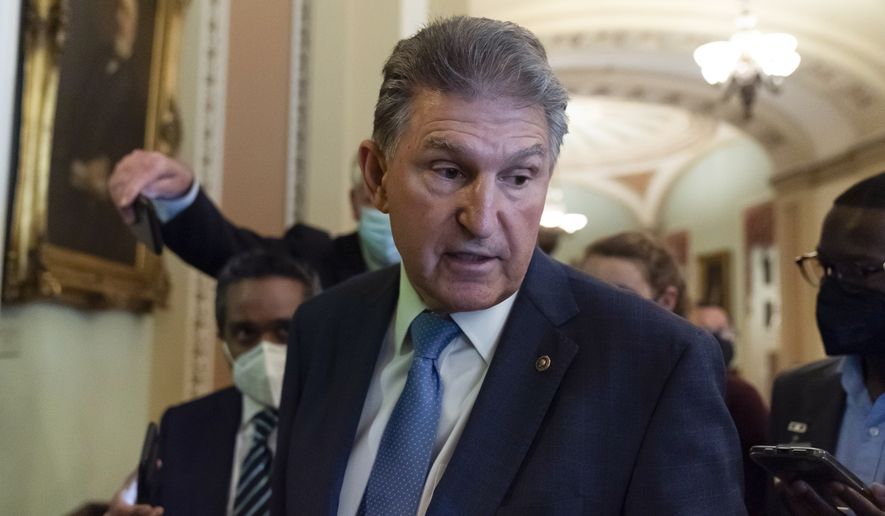President Biden and congressional Democrats are scrambling to find a way to significantly address climate change after Sen. Joe Manchin III has signaled his opposition to the administration’s proposal to phase out fossil fuels from electricity production.
Mr. Manchin, a moderate Democrat from West Virginia and key vote for the White House’s domestic agenda, has told senior administration officials he will not sign on to the program.
“The administration and the president are committed to bold … climate action,” Transportation Secretary Pete Buttigieg said during a Sunday appearance on CNN. “Exactly what legislative form that takes is what’s being negotiated right now, but the bottom line is we have to act on climate for the good of our children, and by the way for the good of our economy.”
Mr. Biden initially sought to include a $150 billion tax credit plan within his $3.5 trillion expansion of the federal safety net addressing electricity production. The program would have given federal subsidies to electric utility companies if they switched from coal and natural gas to solar and wind power. Under the plan, utilities that failed to reach a certain carbon reduction threshold annually would face several financial penalties.
Mr. Manchin, chairman of the Senate Energy Committee, was initially tasked with writing the new program into law. After months of negotiations, he told the White House he would be unable to support the plan because of its adverse impact on coal and natural gas, two resources vital to West Virginia’s economy.
Since Democrats planned to push the package along party lines within the evenly split Senate, Mr. Manchin’s opposition kills the program. The reality has left administration officials scouring for another way to meet Mr. Biden’s pledge to curb greenhouse gas emissions by more than 50% over the next decade.
“The longer you take to deal with [climate change], the more there will be costs and livelihoods, in dollars and of course in life, so this remains a core commitment of this administration,” Mr. Buttigieg said.
The gaping political divisions among Democrats over Mr. Biden’s $3.5 trillion social welfare and climate change bill were put on public display in West Virginia last week.
Senate Budget Committee Chairman Bernard Sanders penned an op-ed in the state’s largest newspaper, the Charleston Gazette-Mail, championing the bill and haranguing the Democratic holdouts preventing its passage. Mr. Sanders, in particular, attempted to shame Mr. Manchin for his opposition to the package.
“Poll after poll shows overwhelming support for this legislation,” wrote Mr. Sanders, a self-described socialist from Vermont. “Yet, the political problem we face is that in a 50-50 Senate we need every Democratic senator to vote ‘yes.’ We now have only 48.”
Democrats had planned to use a special procedure to force the $3.5 trillion spending package through the Senate along party lines. The process, known as budget reconciliation, allows some spending and tax measures to avoid the 60-vote filibuster threshold and pass with a simple majority of 51 votes.
To succeed, Democrats cannot afford to lose a single vote. At the moment, Mr. Manchin and another moderate, Sen. Kyrsten Sinema of Arizona, are the Democratic holdouts.
“This is a pivotal moment in modern American history,” Mr. Sanders wrote.
The editorial elicited a nearly immediate slap down from Mr. Manchin, the lone statewide Democrat left in increasingly Republican West Virginia.
“This isn’t the first time an out-of-stater has tried to tell West Virginians what is best for them despite having no relationship to our state,” Mr. Manchin said in a statement.
Arguing that the policies advocated by the $3.5 trillion bill were wrong for a country in the throes of inflation, Mr. Manchin said he would oppose any effort to throw “more money on an already overheated economy.”
“To be clear, again, Congress should proceed with caution on any additional spending and I will not vote for a reckless expansion of government programs,” he said. “No op-ed from a self-declared independent socialist is going to change that.”
The dust-up is only the most recent in a months-long back and forth between Mr. Manchin and Mr. Sanders over the $3.5 trillion spending bill.
Dubbed “human infrastructure,” the massive bill includes a trove of long-sought liberal priorities, including free community college, expanded Medicare and new regulations to combat climate change.
Mr. Manchin and Ms. Sinema say the bill is too ambitious and should be trimmed and means-tested. Far-left Democrats, including Mr. Sanders, object to cutting out any major programs, saying instead that overall costs can be cut by making the legislation run for five years instead of 10.
• Haris Alic can be reached at halic@washingtontimes.com.




Please read our comment policy before commenting.